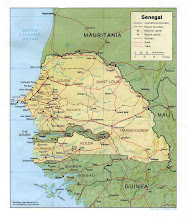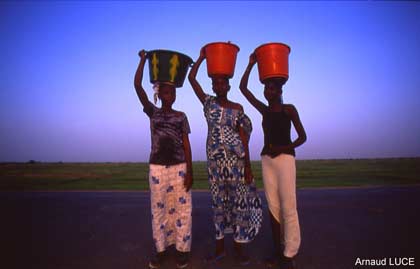An article in today's SudQuotidien expressed public concern over Senegal's drop on the 2008 "corruption index" produced by Transparency International. Although Senegal is not among the most corrupt on the index, its position fell considerably on the 2008 index...
Construction companies and public works of major exporting countries in Senegal "are identified as most likely to pay bribes to the authorities of host countries," according to the 2008 corruption index. One way to understand the increase in "pots-de-vin" (bribes) is the source of bribes. Transparency International also indexed the countries with the companies most likely to offer bribes. The worst, in order, were Russia, China, Mexico and India.
Senegal does significant business with both China and India. China is engaged in major infrastructure projects, especially around Touba. As we have noted before, India's trade with Senegal has skyrocked in the last five years to lead all others.
The solution Transparency International recommends is, naturally, transparency. Major bidding processes and results should be made public. It cited recent mining deals as an example.
The SudQuotidien article calls increasing corruption a "trap." Rightly so. The well known corrolary to the corruption index is the poverty index--the more corruption, the less likely that a country will develop economically.
Monday, December 15, 2008
Monday, December 8, 2008
Groundnut harvest way up; a welcome relief for Senegal farmers
Dec. 8 (Bloomberg) -- Peanut production in Senegal will probably increase 66 percent to 550,000 metric tons in the 2008-09 season after plantings increased, according to the U.S. Department of Agriculture.
Output fell 28 percent to 331,200 tons in the 2007-08 season, from the previous year, because of poor rainfall, the department’s Foreign Agricultural Service said on its Web site.
Peanuts are the primary cash crop and source of income for most Senegalese farmers, according to the FAS.
Output fell 28 percent to 331,200 tons in the 2007-08 season, from the previous year, because of poor rainfall, the department’s Foreign Agricultural Service said on its Web site.
Peanuts are the primary cash crop and source of income for most Senegalese farmers, according to the FAS.
Labels:
farmers,
groundnuts,
peanuts,
Senegal
Iran and Senegal launch SENIRAN auto assembly plant in Senegal
Iran Khodro, the biggest automobile producer in the Middle East has inaugurated a new assembly plant in the African country of Senegal.
Senegalese president, Abdoulaye Wade, asked for Iran Khodro cars, Bardo pick-up and Peugeot Roa besides Samand passenger car to be produced in SENIRAN AUTO and be exported to the West African countries, said IKCO CEO and president, Manouchehr Manteghi.
During the inauguration ceremony of SENIRAN AUTO in Senegal Manteghi emphasized: Considering Iran Khodro’s strategic plans for its global sales, Central Asian, Middle Eastern and North and West African countries are our points of interest. Senegal’s special position in the region, neighboring seven countries with political an economical ties helped us to make up our mind for establishing a site in this country.
Mentioning that this production line is not a uni-functional one, he added: Right now, Samand passenger car under the name of "Mandory" is produced in this site; however Bardo pick-up, Peugeot Roa, and Pars can also be produced by this assembly line if needed.
Referring to IKCO's car making site in Senegal, Manteghi claimed that foreign companies have already announced their willingness for manufacturing their products in this site.
Renewing public transportation in Senegal has been one of the sources of interest for Senegal's government based on which 2000 Samand made their way to this country, he added. According to Manteghi, around $60 million have been invested on Samand assembly site in Senegal with Iran Khodro and Senegalese government and private sector together putting in 60 and 40 percent respectively.
It's noteworthy that Iran Khodro has established one of the biggest after-sale service centers in Senegal.
Senegalese president, Abdoulaye Wade, asked for Iran Khodro cars, Bardo pick-up and Peugeot Roa besides Samand passenger car to be produced in SENIRAN AUTO and be exported to the West African countries, said IKCO CEO and president, Manouchehr Manteghi.
During the inauguration ceremony of SENIRAN AUTO in Senegal Manteghi emphasized: Considering Iran Khodro’s strategic plans for its global sales, Central Asian, Middle Eastern and North and West African countries are our points of interest. Senegal’s special position in the region, neighboring seven countries with political an economical ties helped us to make up our mind for establishing a site in this country.
Mentioning that this production line is not a uni-functional one, he added: Right now, Samand passenger car under the name of "Mandory" is produced in this site; however Bardo pick-up, Peugeot Roa, and Pars can also be produced by this assembly line if needed.
Referring to IKCO's car making site in Senegal, Manteghi claimed that foreign companies have already announced their willingness for manufacturing their products in this site.
Renewing public transportation in Senegal has been one of the sources of interest for Senegal's government based on which 2000 Samand made their way to this country, he added. According to Manteghi, around $60 million have been invested on Samand assembly site in Senegal with Iran Khodro and Senegalese government and private sector together putting in 60 and 40 percent respectively.
It's noteworthy that Iran Khodro has established one of the biggest after-sale service centers in Senegal.
The Khalife guarantees that Touba work continues
The massive intrastructure and public improvements underway in Touba continue, according to the Khalife of the Mourides, by way of a news report. He assures that the water system infrastructure and other projects were never stalled.
The Khalife, Serigne Mouhamadou Lamine Bara Mbacké, took efforts to emphasize the cooperation of the Holy City with the President of Senegal, Abdoulaye Wade:
"The water project has started. Again, we are in step with the president because he had given the sum of seven billion CFA francs. Then he comes back three and a half billion for drilling, pipes, fountains throughout the city."
Addressing reports that the work had been stopped for lack of funding, the Khalife was reported to state: "The work has never been suspended. Those who say they do not know anything."
Since President Wade showed up with the payments in his recent visit to Touba, relations with the Holy City appear to have warmed up considerably. This at a time when the president is facing political opposition.
The Khalife, Serigne Mouhamadou Lamine Bara Mbacké, took efforts to emphasize the cooperation of the Holy City with the President of Senegal, Abdoulaye Wade:
"The water project has started. Again, we are in step with the president because he had given the sum of seven billion CFA francs. Then he comes back three and a half billion for drilling, pipes, fountains throughout the city."
Addressing reports that the work had been stopped for lack of funding, the Khalife was reported to state: "The work has never been suspended. Those who say they do not know anything."
Since President Wade showed up with the payments in his recent visit to Touba, relations with the Holy City appear to have warmed up considerably. This at a time when the president is facing political opposition.
Labels:
infrastructure,
Khalife,
Mourides,
Touba
Subscribe to:
Comments (Atom)


